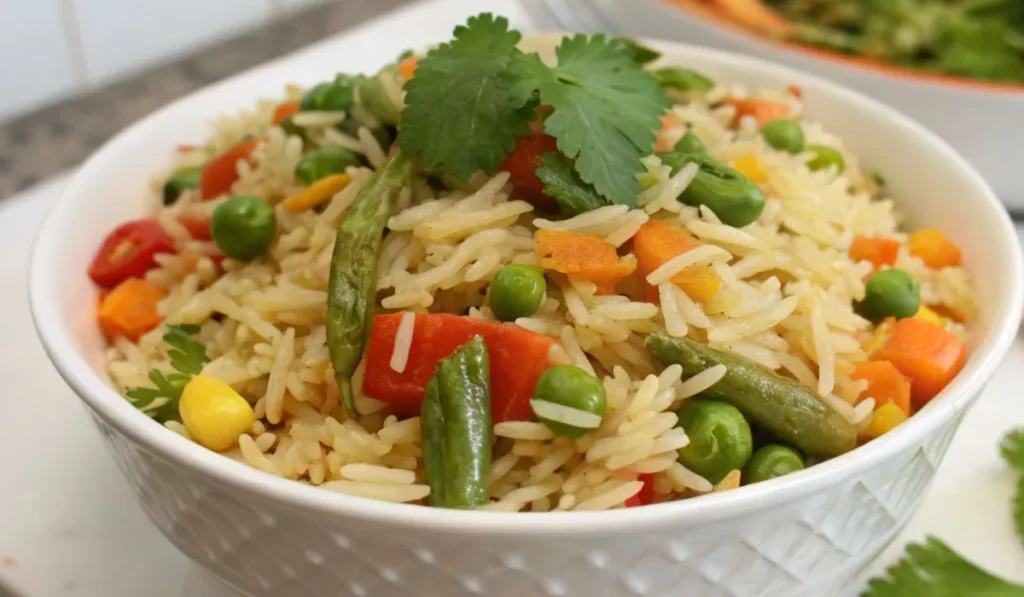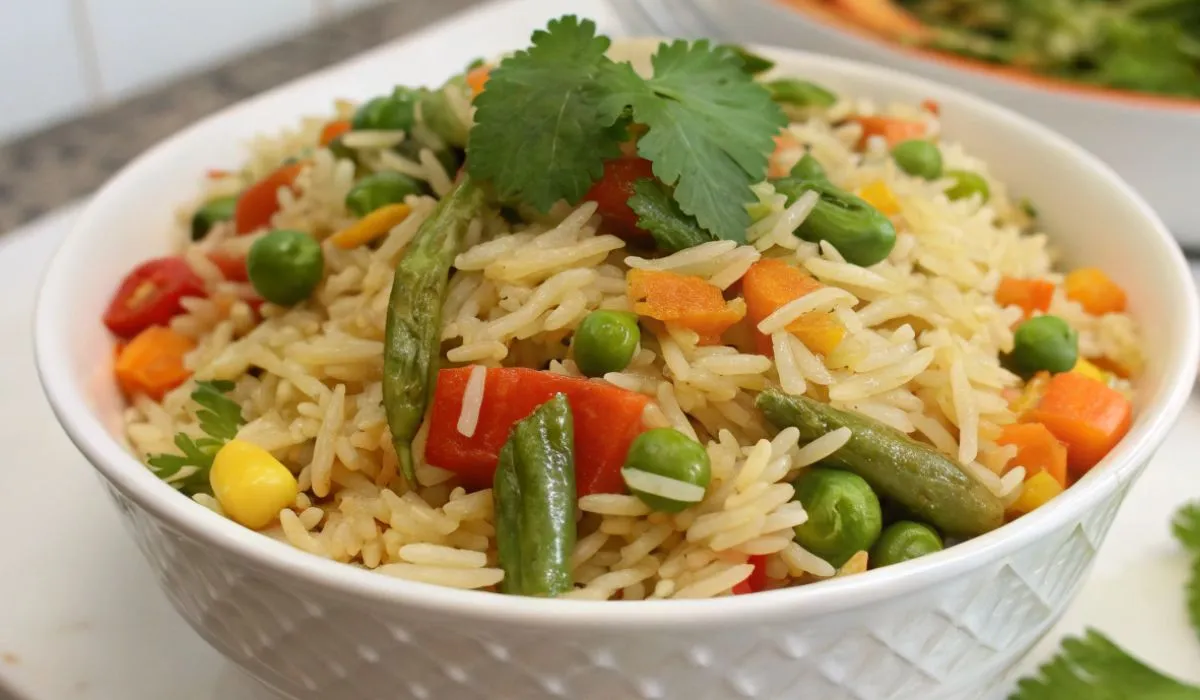A flavorful veg pulao recipe combines aromatic basmati rice with fresh vegetables and fragrant spices to create the perfect one-pot meal.
This vegetable pulao has been a staple in Indian kitchens for generations, offering a complete and satisfying dish that works beautifully for lunch or dinner.
I’ve been making this simple pulao for over five years, and it never fails to impress my family and guests.
The combination of mint, coriander, and whole spices creates layers of flavor that make each bite memorable.

Essential Ingredients for Perfect Vegetable Pulao
The key to making exceptional pulao lies in selecting quality ingredients that complement each other perfectly.
- Basmati rice – 1 cup, soaked for 20 minutes for the best texture
- Mixed vegetables – beans, carrots, peas, capsicum, and potatoes cut into equal sizes
- Fresh herbs – coriander and mint leaves for that authentic flavor
- Whole spices – cardamom, cinnamon, cloves, and bay leaves for aromatic depth
- Aromatics – onion, ginger, garlic, and green chilies for the flavor base
- Ghee or oil – 2 tablespoons for cooking and richness
- Water or vegetable stock – 2 cups for cooking the rice
Step-by-Step Pulao Cooking Instructions
Making this rice dish becomes effortless when you follow these simple steps in order.
- Prepare the herb paste by blending coriander, mint, ginger, garlic, green chilies, and whole spices with water until smooth
- Heat ghee in a heavy-bottomed pan and add cumin seeds, bay leaf, and remaining whole spices
- Add sliced onions and cook until they turn light golden and fragrant
- Include chopped tomatoes and cook until they become soft and mushy
- Add all vegetables starting with harder ones like potatoes and carrots first
- Mix in the herb paste and salt, cooking for 2-3 minutes until aromatic
- Pour water or stock and bring to a rolling boil
- Add soaked rice, stir gently, cover, and simmer for 20 minutes on low heat
- Let it rest for 10 minutes before opening the lid and serving
Pro Tips for Restaurant-Style Pulao
These expert techniques will elevate your homemade pulao to professional standards.
- Use the absorption method with a 1:2 rice to water ratio for perfectly cooked grains
- Soak basmati rice for at least 20 minutes to prevent breaking during cooking
- Layer cooking approach helps vegetables cook evenly without becoming mushy
- Low heat simmering ensures the rice absorbs all flavors without burning
- Resting time allows the pulao to steam and develop better texture
- Fresh herb paste makes a significant difference compared to dried herbs
Nutritional Benefits of Mixed Vegetable Pulao
This wholesome dish provides balanced nutrition that makes it ideal for family meals.
- Complete carbohydrates from basmati rice provide sustained energy
- Vegetable fiber aids digestion and adds essential vitamins
- Protein content increases when served with yogurt raita or dal
- Healthy fats from ghee support nutrient absorption
- Antioxidants from fresh herbs boost immune system function
- Low sodium when made at home compared to restaurant versions
Best Serving Suggestions and Accompaniments
Pairing your pulao with the right sides enhances the overall dining experience.
- Cucumber raita provides cooling contrast to the spiced rice
- Onion tomato salad adds fresh crunch and tangy flavor
- Pickle or achaar brings additional spice and flavor complexity
- Papadum or roasted poppadoms offer textural variety
- Simple dal makes it a more complete protein meal
- Boiled eggs can be added for extra protein and richness
Storage and Reheating Guidelines
Proper storage keeps your leftover pulao fresh and delicious for days.
- Refrigerate within 2 hours of cooking to maintain food safety
- Store in airtight containers for up to 3 days in the refrigerator
- Reheat with steam method by sprinkling water and covering while heating
- Microwave reheating works well with a damp paper towel covering
- Avoid repeated heating to maintain texture and prevent bacterial growth
- Freeze portions for up to one month in freezer-safe containers
Common Mistakes to Avoid
Learning from these frequent errors will help you master this Indian rice recipe.
- Overcooking vegetables leads to mushy texture and poor presentation
- Using too much water creates soggy, sticky rice instead of separate grains
- Skipping the soaking step results in broken rice and uneven cooking
- High heat cooking can burn the bottom while leaving rice undercooked
- Opening the lid frequently releases steam needed for proper cooking
- Adding salt directly to rice without mixing can create uneven seasoning
Flavor Variations to Try
Experimenting with different ingredients keeps this classic dish exciting and new.
- Coconut milk pulao uses coconut milk instead of water for richness
- Saffron version adds luxury and beautiful golden color
- Protein additions like paneer, chicken, or mutton create heartier meals
- Regional spice blends from different Indian states offer unique flavors
- Seasonal vegetables keep the dish interesting throughout the year
- Nut garnishes like cashews and almonds add texture and richness
This vegetable pulao recipe has never disappointed me in over five years of cooking.
The beauty lies in its simplicity and the way each ingredient contributes to the final harmony of flavors.
Whether you’re cooking for weekday lunch boxes or weekend family gatherings, this one-pot wonder delivers consistent results every time.

Easy Veg Pulao Recipe
Ingredients
Equipment
Method
- Soak basmati rice in water for 20 minutes, then drain and set aside.
- In a food processor or blender, combine coriander leaves, mint leaves, ginger, garlic, green chilies, cardamom pods, cinnamon stick, cloves, fennel seeds, and 1/4 cup water. Blend until you get a smooth paste. Set aside.
- Heat ghee or oil in a heavy-bottomed pot over medium heat. Add cumin seeds, bay leaf, cinnamon stick, cardamom pods, cloves, black pepper powder, and cashew nuts. Sauté for 1-2 minutes until aromatic.
- Add sliced onions to the pot and cook until they turn light golden brown, about 3-4 minutes.
- Add chopped tomatoes and cook until they become soft and mushy, about 3-4 minutes.
- Add all the vegetables (beans, bell pepper, peas, carrot, and potato) to the pot. Sauté for 2-3 minutes until they start to soften slightly.
- Add the prepared herb paste and salt. Mix well and cook for 2-3 minutes until the paste is well incorporated and aromatic.
- Pour in 2 cups of water or vegetable stock and bring to a rolling boil.
- Add the soaked and drained basmati rice to the boiling water. Stir gently to distribute evenly.
- Once the water comes to a boil again, reduce heat to low, cover the pot with a tight-fitting lid, and simmer for 18-20 minutes without opening the lid.
- After 20 minutes, turn off the heat and let the pulao rest for 10 minutes without opening the lid. This allows the rice to steam and absorb all the flavors.
- Gently mix the pulao with a fork, garnish with fresh coriander leaves if desired, and serve hot with raita or yogurt.
Notes
- Always soak basmati rice for at least 20 minutes to prevent breaking and ensure even cooking.
- Use the absorption method with a 1:2 rice to water ratio for best results.
- Don’t open the lid during cooking as it releases essential steam.
- Let the pulao rest after cooking for better texture and flavor absorption.
- You can substitute vegetables based on your preference or seasonal availability.
- For richer flavor, use vegetable stock instead of plain water.
- Store leftovers in the refrigerator for up to 3 days and reheat with a splash of water.
